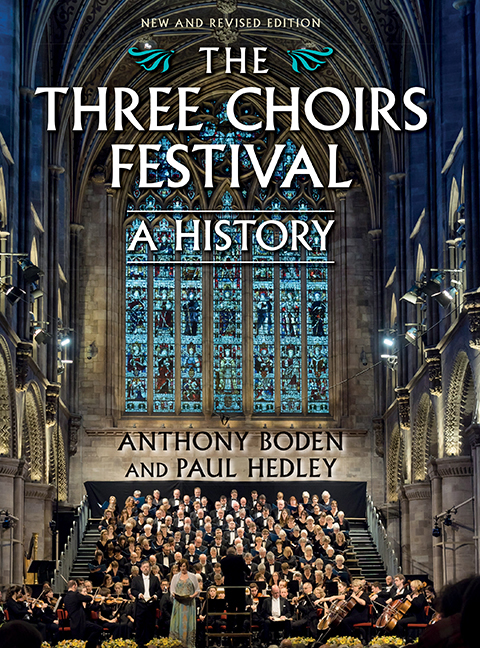Book contents
- Frontmatter
- Contents
- List of Illustrations
- Preface
- Acknowledgements
- List of Abbreviations
- List of Cathedral Organists
- 1 Origins
- 2 A Fortuitous and Friendly Proposal
- 3 A Numerous Appearance of Gentry
- 4 ‘The Musick of my Admiration Handel’
- 5 The Gentlemen and the Players
- 6 Avoiding Shipwreck
- 7 Prima voce
- 8 Favourites and Flops
- 9 Sacred and Profane
- 10 Froissart
- 11 The Unreasonable Man
- 12 The Dream
- 13 Beyond these Voices
- 14 An Essentially English Institution
- 15 The Elgar Festivals
- 16 Dona nobis pacem
- 17 Recovery
- 18 Association
- 19 A New Epoch
- 20 Jubilee
- 21 Theme with Variations
- 22 Houses of the Mind
- 23 ‘A Gold-Plated Orchestra’
- 24 A New Millennium
- 25 Reorganisation
- 26 An Invitation to the Palace
- Appendix Three Choirs Festival Timeline
- Select Bibliography
- Index
- Plate section
14 - An Essentially English Institution
Published online by Cambridge University Press: 11 August 2017
- Frontmatter
- Contents
- List of Illustrations
- Preface
- Acknowledgements
- List of Abbreviations
- List of Cathedral Organists
- 1 Origins
- 2 A Fortuitous and Friendly Proposal
- 3 A Numerous Appearance of Gentry
- 4 ‘The Musick of my Admiration Handel’
- 5 The Gentlemen and the Players
- 6 Avoiding Shipwreck
- 7 Prima voce
- 8 Favourites and Flops
- 9 Sacred and Profane
- 10 Froissart
- 11 The Unreasonable Man
- 12 The Dream
- 13 Beyond these Voices
- 14 An Essentially English Institution
- 15 The Elgar Festivals
- 16 Dona nobis pacem
- 17 Recovery
- 18 Association
- 19 A New Epoch
- 20 Jubilee
- 21 Theme with Variations
- 22 Houses of the Mind
- 23 ‘A Gold-Plated Orchestra’
- 24 A New Millennium
- 25 Reorganisation
- 26 An Invitation to the Palace
- Appendix Three Choirs Festival Timeline
- Select Bibliography
- Index
- Plate section
Summary
AS World War I drew to a close, speculation began about the future of the great national musical festivals. On 14 September 1918 a lengthy article appeared in the Saturday Review:
Is the Musical Festival, triennial or otherwise, a thing of the past? For our part we think and hope not; but some people, who claim to speak with knowledge, are rather confident in their opinion that after the War there will be no regular resumption of these gatherings, which have naturally been suspended since the Autumn of 1914. And one thing is certain: if not held regularly they may as well not be held at all; for it is precisely because their occurrence hitherto has been as calculable as a solar eclipse or the landlord's demand for rent that they have been of real value in an artistic sense.
Going on to describe the provincial Festival as having been ‘one of the prime glories of musical life in this country’, the article stressed the key role which it had played in maintaining England's old supremacy in the department of choral singing, and ended with a plea for its future life: ‘After all, at a Festival it is not the band, nor the soloists, nor the novelties, nor the conductor, but the choir that's ‘the thing’. We could ill spare the institution that created the brilliant constellation to surround such a glorious central orb.’
Since the last Three Choirs Festival had been held in Gloucester in 1913, it was the turn of Worcester to lead off after the war – but the choral members in each of the three cities were all keen to accept the challenge. On the third Saturday in January 1919, Lord Coventry presided over a meeting of the Worcester Executive Committee. Four questions had been submitted to the Deans and Chapters and Festival Committees of Worcester, Hereford and Gloucester: (1) Should the Festivals be revived; (2) if so, what should their form and character be; (3) what should be the limit of expenditure incurred; and (4) where should the next Festival be held?
- Type
- Chapter
- Information
- The Three Choirs Festival: A HistoryNew and Revised Edition, pp. 192 - 197Publisher: Boydell & BrewerPrint publication year: 2017

